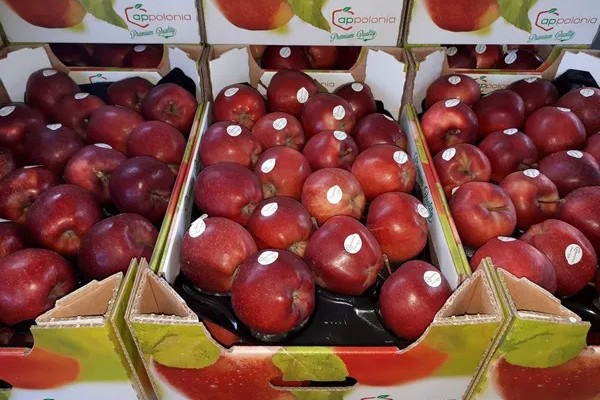Some of the Polish apple varieties are still plentiful in stock and are expected to be in supply for the rest of the season. However, according to Jakub Krawczyk, export manager for Polish apple exporter Appolonia, there are some varieties of apples that are quite hard to procure at this point of the season:
"At the moment there are still big volumes of Golden, but also quite a good numbers of Red Jonaprince and Idared. We think that it won't be any problem to obtain these three varieties up until the end of the season, so we'll be able to supply our clients all year-round. Some varieties, like Champion, are quite hard to get right now and it's a very popular variety in the Polish supermarket shelves. We also have some Conference pears available, still. Because of some frost at night in the last few days, apple availability has dropped. We don't know the exact numbers yet, in terms of how much the new crop will be damaged and so on, but we can say for sure that the weather did affect the new crop."

Although demand for apples hasn't really changed, the availability of apples has, meaning supply is lower, Krawczyk explains. "Demand hasn't really increased over the past few weeks, but the availability of some apples has certainly decreased. There's a big need for Champion right now, because of promotions in the largest markets in Poland. Also, everybody can observe that the flowering has started earlier this year, due to a very warm week at the start of April. From what we heard, this situation was not exclusive to Poland, but also in some other European countries. Demand for Idared still hasn't started on a big scale, but we're optimistic about it and are sure that the time for Idared will still come."
Krawczyk states that next to prices being high, some growers are also demanding payment per kg up front, which changes the market situation: "For some varieties the price has increased, it's hard to say whether this increase will continue in the following weeks. Basically, Gala is only available if you will pay the growers per kg, and upfront. Not too many growers are willing to sell it for sorting right now. All Jonagolds are more expensive at the moment, and the price of industry apples price is also still high."
The Red Sea crisis did cause the biggest problems, most important of which being the delays exporters faced, Krawczyk says. "Because there are still some containers on the way to Asia, we're hoping to not have any more delays. These delays were our biggest concern this season. I think most of the companies that exported apples have had big problems with transport, as we're all facing similar issues. Demand for apples was strong. but getting the good connection for transport was like a lottery. We just hope everybody can close the season without any losses."
With the new season in mind, the current weather is worrying for Polish apple growers. Spring frosts could damage the new crop, but Krawczyk says there is currently no data available to know the exact effects of the weather conditions: "Right now, we needed to deal with the frosts at night, so many growers had very busy days doing over-crown irrigation. Data from the negative temperatures are now presented by many news portals and in some regions it really did not look good. We need to wait a bit for the official data regarding apple production in Poland."
If the Red Sea crisis is not resolved before the new season begins, Krawczyk acknowledges they might have to change their strategy a bit. "We will need to think how and where is the best and safest place to send our apples if the conflict will continue in the Red Sea area. Unfortunately new conflict between Israel and Iran has just began so sending apples to Israel is also right now very risky. We are also looking forward for South America markets and we hope that registration procedures in countries like Ecuador or Brazil will be soon signed and we will be able to export there directly," he concludes.
For more information:
Jakub Krawczyk
Appolonia
Tel: +48 785 342 930
Email: jakub.krawczyk@appolonia.pl
www.appolonia.pl
